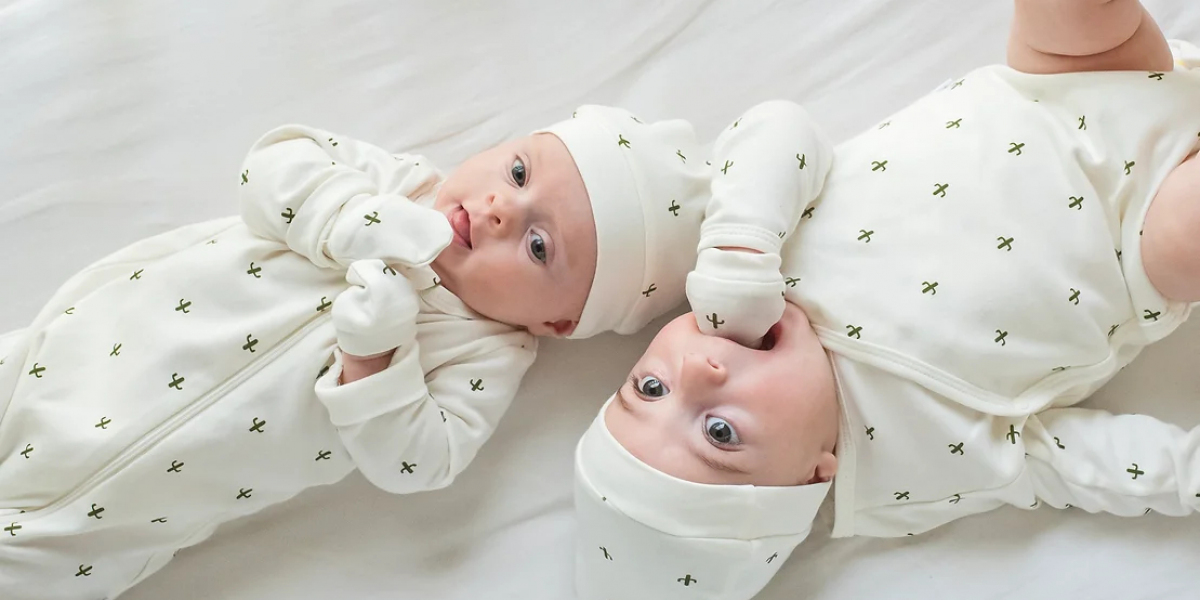Which Cotton is Best for Babies: Organic or Regular?
When it comes to the delicate skin of a baby, parents are often left with the question: Which cotton is best for my child—organic or regular? Cotton is one of the most common fabrics used in baby clothing, bedding, and even diapers. However, not all cotton is created equal, and understanding the differences between organic and regular cotton can help you make an informed decision for your little one. This blog will explore the benefits and drawbacks of both types of cotton, focusing on their impact on babies’ health, the environment, and sustainability.
Understanding Cotton: Organic vs. Regular
What is Regular Cotton?
Regular cotton, also known as conventional cotton, is widely used in textiles worldwide. It’s a durable and breathable fabric, which makes it ideal for clothing and bedding. However, the process of growing, harvesting, and processing regular cotton is far from natural. Conventional cotton farming often involves the use of synthetic pesticides, fertilizers, and genetically modified seeds. These practices are aimed at maximizing yield and minimizing the impact of pests and diseases on crops.
If you looking for newborn baby clothes? If yes then visit Tickle Tickle for more information.
Key Characteristics of Regular Cotton:
Synthetic Pesticides and Fertilizers: Regular cotton farming uses chemical-based pesticides and fertilizers to boost yield and protect the crop from pests. These chemicals can remain in trace amounts in the final product, which may cause irritation or allergic reactions in sensitive individuals, including babies.
Genetically Modified Organisms (GMOs): Regular cotton is often genetically modified to increase resistance to pests and improve yield. While the use of GMOs is considered safe by many regulatory bodies, some consumers prefer to avoid genetically modified products.
Energy and Water Consumption: Growing conventional cotton requires significant amounts of water and energy. Cotton farming is notorious for its high water usage, particularly in regions where water scarcity is a concern.
Chemical Residues: During the processing phase, regular cotton is often treated with chemical dyes and finishes to achieve the desired texture and color. These chemical residues can sometimes be harsh on a baby’s sensitive skin.
Are you looking for baby clothes online? If yes then visit Tickle Tickle for more information.
What is Organic Cotton?
Organic cotton is grown and processed without the use of synthetic pesticides, fertilizers, or genetically modified seeds. Instead, organic farmers use natural methods such as crop rotation, organic compost, and biological pest control to maintain the health of their crops. Organic cotton is not only a sustainable choice but also a safer option for babies.
Key Characteristics of Organic Cotton:
No Harmful Chemicals: Organic cotton farming avoids synthetic pesticides and fertilizers, reducing the risk of chemical residues in the final product. This makes it a safer choice for babies, particularly those with sensitive skin or allergies.
Natural Farming Practices: Organic cotton farmers rely on natural farming techniques that promote soil health and biodiversity. This reduces the environmental impact of cotton farming and supports long-term sustainability.
Soft and Breathable: Organic cotton tends to be softer than conventional cotton because it is processed without harsh chemicals. Its natural fibers make it more breathable, which is essential for regulating a baby’s body temperature.
Hypoallergenic: Because organic cotton is free from harmful chemicals and synthetic finishes, it is less likely to cause allergic reactions or skin irritations. This is a key factor for parents concerned about the sensitivity of their baby’s skin.
Sustainability: Organic cotton is produced in a more environmentally sustainable way, using less water and energy compared to conventional cotton. It also supports fair labor practices and better working conditions for farmers.
The Benefits of Organic Cotton for Babies
Gentle on Sensitive Skin
Babies have sensitive, delicate skin that is more prone to irritation and allergic reactions. Organic cotton is a gentler fabric because it is free from harmful chemicals, such as formaldehyde, chlorine bleach, and toxic dyes, which are often used in regular cotton products. Organic cotton is hypoallergenic, which means it is less likely to cause skin rashes, eczema, or other skin conditions in babies. This makes organic cotton the best choice for newborns and infants, whose skin is still developing and highly sensitive.
If you looking for a Baby gift set? If Yes then visit Tickle Tickle for more information.
Breathability and Comfort
Organic cotton’s natural fibers are more breathable than conventional cotton, allowing better air circulation and moisture-wicking properties. Babies can easily overheat or become cold, especially while sleeping. Organic cotton clothing and bedding can help regulate a baby’s body temperature, ensuring they remain comfortable throughout the day and night.
Chemical-Free
Organic cotton is grown without the use of synthetic pesticides or fertilizers, and it is processed without toxic chemicals. This makes it a safer option for babies who are prone to chewing on their clothes or blankets. When a baby’s mouth comes into contact with organic cotton, there is a significantly lower risk of chemical ingestion.
Durability and Longevity
Organic cotton is known for its durability. Despite being softer and more comfortable, it can withstand frequent washing and wear, making it a cost-effective option in the long run. Baby clothes and bedding are washed frequently, and organic cotton products tend to hold up better over time compared to regular cotton, which can degrade more quickly due to chemical treatments.
The Environmental Impact
While the safety and comfort of your baby are top priorities, it’s also important to consider the environmental impact of the fabrics you choose. Conventional cotton farming is one of the most environmentally damaging agricultural practices in the world. It requires large amounts of water, synthetic pesticides, and fertilizers, which can lead to soil degradation, water pollution, and harm to local ecosystems.
Water Usage
Conventional cotton is a water-intensive crop. It takes around 2,700 liters of water to produce the cotton needed for just one T-shirt. Organic cotton, on the other hand, is grown using rain-fed farming techniques in many regions, which significantly reduces the water footprint.
Pesticide Pollution
The chemicals used in conventional cotton farming can seep into local water supplies and soil, posing a risk to wildlife, local communities, and the environment. Organic cotton farming avoids these harmful chemicals, contributing to cleaner air, water, and soil.
Biodiversity and Soil Health
Organic farming practices promote biodiversity and improve soil health. Crop rotation, composting, and other sustainable practices help maintain the fertility of the soil and reduce the need for synthetic inputs. This leads to healthier ecosystems and a reduced environmental footprint.
Drawbacks of Organic Cotton
While organic cotton has many benefits, there are some potential drawbacks to consider:
Higher Cost: Organic cotton products tend to be more expensive than regular cotton due to the more labor-intensive farming methods and certification processes. However, many parents feel that the health and environmental benefits outweigh the cost.
Availability: Organic cotton products may not be as widely available as conventional cotton, although this is changing as more brands adopt sustainable practices.
Limited Color and Style Options: Because organic cotton is processed without harmful dyes and bleaches, there may be fewer color and style options available. However, many parents appreciate the natural, earth-tone colors and simple designs often associated with organic baby clothing.
Conclusion: Which Cotton is Best for Babies?
When it comes to choosing between organic and regular cotton for your baby, organic cotton clearly emerges as the better choice for those concerned about health, comfort, and sustainability. Organic cotton is free from harmful chemicals, making it a safer option for babies with sensitive skin or allergies. It is also more breathable and durable, offering better comfort and longevity for everyday use.
In addition to being safer for babies, organic cotton is also a more environmentally friendly and sustainable option. It uses less water, avoids harmful pesticides, and promotes healthier ecosystems. While the higher cost and limited availability may be a drawback for some parents, the long-term benefits of organic cotton make it a worthwhile investment in your baby’s well-being and the planet’s future.
Ultimately, the decision comes down to your priorities as a parent. If the health of your baby and the environment are top concerns, organic cotton is the clear winner. However, if cost and availability are major factors, regular cotton is still a viable option as long as you choose high-quality, certified, and safe products.








